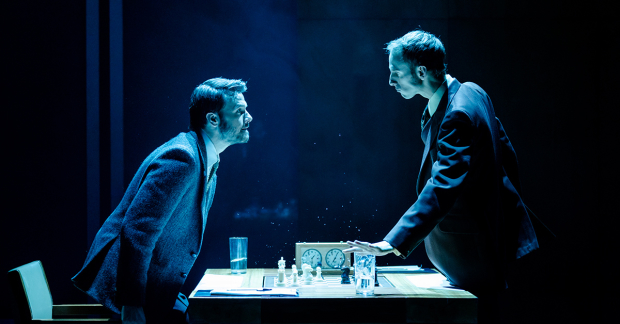Review: Ravens: Spassky vs Fischer (Hampstead Theatre)

© Manuel Harlan
My father was obsessed with the 1972 world chess tournament in Reykjavik between Soviet champion Boris Spassky and his challenger from America, the maverick genius Bobby Fischer. I don't really remember him being much interested in chess before or after, but his attention – like that of the rest of the world – was captured between this encounter between two contrasting men and the systems they seemed to represent.
Many excellent books and documentaries have analysed the event, which was never as simple as it seemed, and you can see why Tom Morton-Smith might think it a good subject for a play. He's got form in this sphere; he wrote the three-hour Oppenheimer for the RSC. Many admired that, but I felt it suffered from the same tendency to flatten its subject. Certainly here, he has turned an explosive story from thrilling drama into a game of slow moves; more stalemate than checkmate, it grinds its audience down with facts rather than fanning them to dramatic life.
The irony on which he concentrates most strongly is that although their chess match was seen as a way of continuing the Cold War by other means, neither Fischer nor Spassky was a typical representative of the societies that spawned them. Fischer may have changed the face of chess, but he was a neurotic, arrogant, unpleasant loner, strongly anti-Semitic and even when charged by Henry Kissinger to be "a soldier now", he played only for himself. Spassky on the other hand, urbane and elegant, refused to have a member of the KGB in his team, and tried to carve out a non-political life at a time when the Soviet Union was doctrinaire and repressive.
There's a lot to work with, but Morton-Smith's writing, which introduces large chunks of exposition in great, clunky gobbets, never brings either man to life. Robert Emms' Fischer shouts a lot and Ronan Raftery's Spassky gets more paranoid, but we don't really see inside their heads. The best scene – perhaps significantly – is an imagined one where a nice Icelandic policeman (a gentle Gary Shelford) talks to Fischer about the ravens that discovered Iceland; flying high to discover new territory, never looking back.
The production, directed by Annabelle Comyn, also fails to solve many of the problems inherent in staging the cerebral activity of a chess tournament. Jamie Vartan's sliding panelled set is predictable and functional; Philip Stewart's soundtrack over-insistent. Having two male parts played by female actresses does nothing to leaven the blokeishness of the thing; though Rebecca Scroggs is rather good as Spassky's team manager. Choreographed sequences (by Mike Ashcroft) which configure the chess matches as physical confrontations, Spassky all nervous tics, Fischer expansive brilliance, last too long, increasing an already substantial running time – and when it comes to the decisive moment of victory, they vanish.
Interesting questions lurk in the margins. "Why do we believe genius is so fragile we cannot ask it to behave?" ponders the president of the World Chess Federation. But they remain unanswered by a play that reaches its own endgame without ever really explaining why Fischer was that exceptional or why he captured the imagination of the world. I think even my Dad might have been bored.










